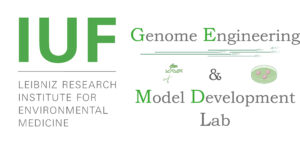The Genome Engineering and Model Development (GEMD) lab uses induced pluripotent stem cells (iPSCs), iPSC- derived organoids, sequencing and genome engineering to model human diseases and investigate the molecular mechanism underlying genetic compensation.
The lab offers several services, including (but not limited to):
- Generation of genome engineering cells and animal models
- Generation of iPSC from somatic cells and iPSC-derived brain, lung and skin organoids
- DNA, RNA and scRNA sequencing using short and long reads.
The lab research focus is centered in the understanding of genetic compensation and its potential relationship with the environment. For this purpose, different models are being used, including iPSC and iPSC-brain organoids. The lab is also focused in developing new tools that facilitate scientific pipelines and or the analysis of data such as MAGECS, Duesselpore and CRISPRnano.

Head of GEMD:
Andrea Rossi
Phenotypic variability due to genetic buffering: The role of environmental factors
Genetic factors can induce and contribute to the development of diseases and aging phenotypes. The dominant and recessive genetic patterns of inheritance described by Mendel represent the extremes of a spectrum of states. It has been demonstrated that the effects of deleterious genetic variations, which would be expected to cause severe phenotypes, can be buffered by cells, thereby mitigating the resulting phenotype. This process known as genetic buffering is based on different mechanisms, such as genetic compensation, transcriptional adaptation and phenotypic plasticity. The factors which are known to contribute to genetic buffering are, in part, thought to be non-genetic in nature, but knowledge in this regard is scarce.In the present application, we postulate that genetic buffering is affected by changing environmental conditions. Genetic buffering is often achieved through the expression of modifier genes. One example is the upregulation of Utrophin in patients with Duchenne muscular dystrophy (DMD), a rare genetic disorder caused by mutations of the dystrophin gene. We want to elucidate whether and how genetic buffering and the regulation of modifier genes are influenced by environmental factors. To this end, we already generated and characterized human induced pluripotent stem cells (iPSCs) and respective mutants which recapitulate, at a molecular level, DMD and Actin-B (ACTB)-associated syndromes, i.e. human monogenic diseases with a wide phenotypic variance. The corresponding modifier genes were identified and validated by RNA sequencing and qPCR analyses, respectively. In the applied research project, we will expose the generated iPSCs to sub-toxic and low toxic concentrations of exposure-relevant environmental factors (air pollutants, food contaminants) and assess their impact on the expression of modifier genes. Given that all of the applied environmental factors may stimulate the generation of reactive oxygen species, and oxidative stress is capable of modulating the expression of genes, incl. including modifier genes, in rodent disease models, we expect to find profound alterations in the expression pattern of the modifier genes. We will next assess the underlying mode of action by focusing on direct effects either on modifier gene regulation or on the genetic compensation machinery. Particularly, we will investigate the effect of the exposure to environmental pollutants at nucleic acid resolution, i.e. by analyzing epigenetic DNA- and epitranscriptomic RNA modifications as well as the global transcriptome. Given that the modulation of genetic buffering and modifier genes is clinically relevant, libraries of small molecules which may modulate the environmentally-susceptible modifiers, will be screened. These studies will provide fundamental insights into the relevance of environmental factors for genetic buffering.
Small molecules that enhance Prime Editing in therapeutic applications
Genome engineering, a transformative biomedical technology, has gained popularity for disease treatment. While current techniques enable straightforward genome manipulation, achieving precise mutations, especially in in vivo translational applications, remains challenging for both efficiency and safety. Common methods inducing DNA double strand breaks (DSBs) often result in undesired outcomes. CRISPR/Cas-mediated genome editing, specifically base editing (BE) and prime editing (PE), offer alternatives. BE faces challenges such as unintentional deamination and bystander mutations. PE, a newer technique, writes genetic information without DSBs, but its efficiency needs improvement. The lab is focused on identifying small molecules that enhance PE efficiency, identifying candidates for further evaluation in clinically relevant models, aiming to advance gene therapy tools for correcting deleterious mutations in patients.
IUF-internal:
WG Esser
WG Fritsche
WG Haarmann-Stemmann
WG Krutmann
WG Schikowski
WG Schins
WG von Mikecz
LG Ventura
LG Weighardt
National:
Prof. Didier Stainier, Developmental Genetics, Max Planck Institute, Bad Nauheim
Prof. Alessandro Prigione, Department of General Pediatrics, Neonatology and Pediatric Cardiology, Heinrich Heine University, Düsseldorf
Prof. Felix Distelmaier, Department of General Pediatrics, Neonatology and Pediatric Cardiology, Heinrich Heine University, Düsseldorf
Dr. Ruchika Anand, Institute of Biochemistry and Molecular Biology, Heinrich Heine University, Düsseldorf
Dr. Nico Meltzer, Department of Neurology, Heinrich Heine University, Düsseldorf
Dr. Melanie Köhler, Leibniz Institute for Food Systems Biology at the Technical University of Munich (LSB), Freising
Prof. Christian Helker, Developmental Genetics and Animal Cell Biology, University of Marburg
Dr. med. Tobias Ruck, Heinrich Heine University, Düsseldorf
International:
Dr. Zacharias Kontarakis, Genome Engineering and Measurement Lab (GEML), ETH Zurich
Prof. Antonio Frigeri, Dipartimento di Scienze mediche di base, neuroscienze e organi di senso, University of Bari
Prof. Paola Nicchia, Dept of Bioscience, Biotechnology and Biopharmaceutics, University of Bari
Dr. Pietro Spitali, DMD Genetic Therapy Group, University of Leiden
- Generation of genome engineering cells and animal models
- Generation of iPSC from somatic cells and iPSC-derived brain, lung and skin organoids
- DNA, RNA and scRNA sequencing using short and long reads

The main task of the core unit is to further develop existing and to establish new organotypic human cultures, to use cutting-edge techniques to manipulate the genome of these models as well as the generation of genetically modified animal models (e.g. C. elegans). In the medium term, the development of the following models is planned for research field 1: lung models based on primary cells which allow the exposure with airborne particles and nanoparticles in the air flow; for research field 3: improvement of existing neurosphere models and development of brain organoids; for research field 2 and 4: long-term cultivable (up to 6 months), human, three dimensional skin models from fibroblasts and keratinocytes.
Scientists
- Thach Nguyen (bioinformatics)
- Haribaskar Ramachandran (genome editing)
Postdocs
- Stephanie Binder (joint project with Thomas Haarmann-Stemmann)
- Jochen Dobner (lung models)
Master student
Technical assistance



